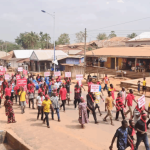Every year on May 1st, Ghanaians join millions of workers to commemorate International Workers’ Day, commonly known as May Day.
But what is the history behind this holiday?
The roots of May Day can be traced back to the late 19th century when labour movements began advocating for better working conditions, fair wages, and the recognition of workers’ rights.
One pivotal event that catalyzed the observance of May Day was the Haymarket affair, which took place in Chicago, United States, in 1886.
On May 1st, 1886, thousands of workers took to the streets in a peaceful demonstration demanding an eight-hour workday.
The protest turned violent when a bomb was thrown, resulting in casualties among both the police and the protesters.
The aftermath of the Haymarket affair led to the eventual recognition of May 1st as a day to honour workers’ rights and commemorate the sacrifices made by labour activists.
Following the Haymarket affair, the May Day fever spread rapidly across the globe, gaining recognition as a day dedicated to workers’ solidarity and social justice.
Today, May Day is celebrated in various countries with parades, rallies, and other events organized by labour unions, worker organizations, and advocacy groups.
The origins of May Day in Ghana can be traced back to the country’s colonial history, the struggles of workers against exploitation, and unfair labour practices.
During the colonial era, Ghanaian workers, like their counterparts in other parts of the world, faced harsh working conditions, low wages, and limited rights.
The emergence of trade unions in Ghana played a crucial role in advocating for workers’ rights and pushing for improved working conditions.
Organizations such as, the Trades Union Congress (TUC) of Ghana became instrumental in mobilizing workers and raising awareness about labour issues.
Following Ghana’s independence in 1957, the government of Kwame Nkrumah officially recognized May Day as a public holiday, affirming its significance in the country’s history.
The May Day celebration was suspended after the first military coup on February 24, 1966, which toppled Dr Nkrumah’s Convention People’s Party (CPP) government.
The celebration later resumed in 1967, after the January 13, 1972, military coup led by General Ignatius Kutu Acheampong. This event was marked with a grand national parade held at the forecourt of the Accra Community Centre that year.
It was attended by hundreds of workers from the Accra-Tema Metropolitan Area which saw the formal institutionalisation of May Day awards to dedicated workers of the TUC led by Secretary-General Alhaji A.M. Issiful.
After the country’s third military coup on December 31, 1981, dubbed the ‘December 31 Revolution’ the Executive Board of TUC decided to decentralise the national parades to the regional capitals by rotation to enable each region to experience hosting such important workers’ anniversary events.
In pursuit of this rotation system, Koforidua held it in 1989, followed by Tamale, Takoradi, Obuasi, Cape Coast and Ho in 2002. Wa in the Upper West region hosted the national parade in 2022, while Bolgatanga hosted it in 2023.
Over the years, these colourful parades have often been characterised by floats and jubilations by unionised and non-unionised workers such as farmers, fishers, market traders and various voluntary organisations.
May Day in Ghana is not just a day for celebration but also a time of reflection on the challenges facing workers and the ongoing struggle for social justice.
The global theme of this year’s celebration is, “Social Justice and Decent Work for All”.
















